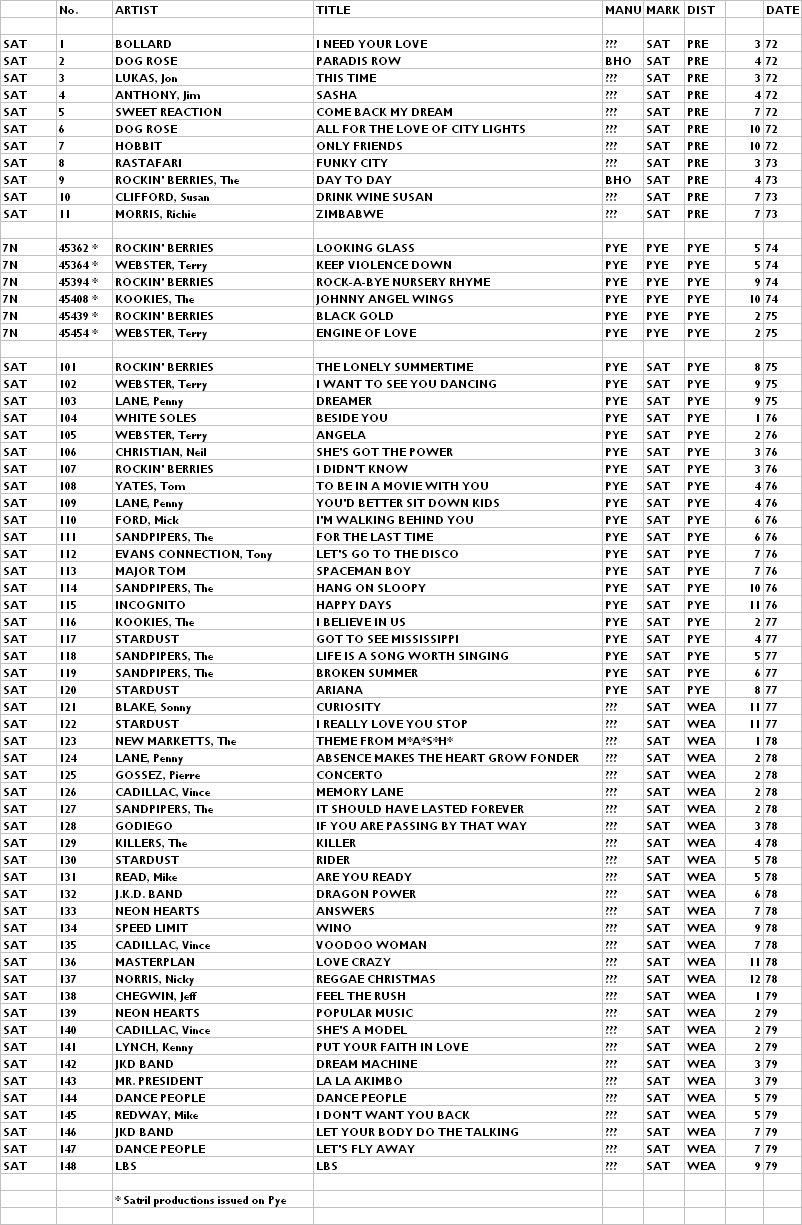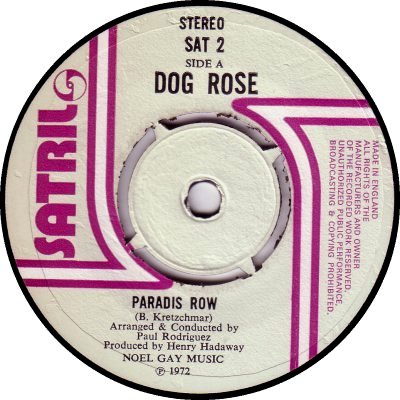
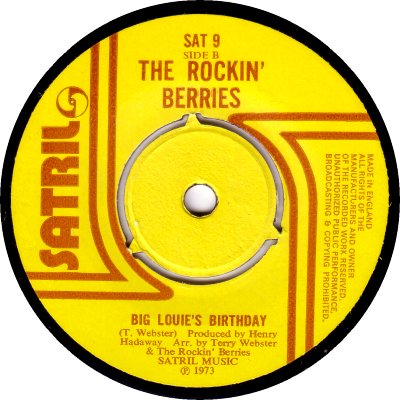
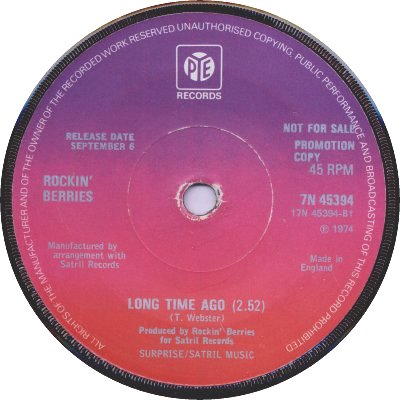
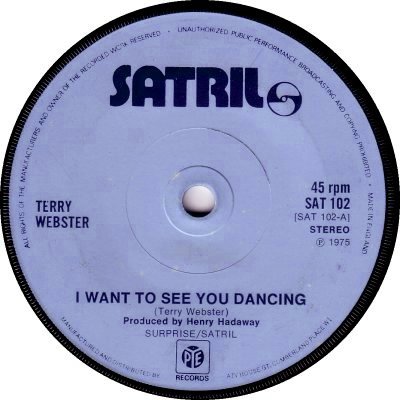
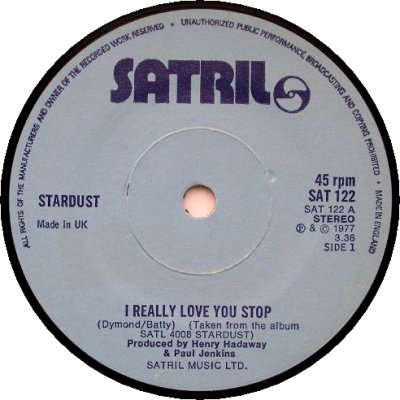
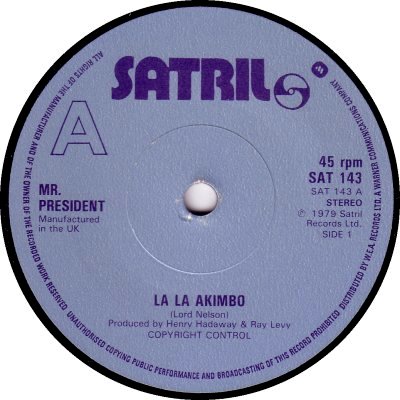
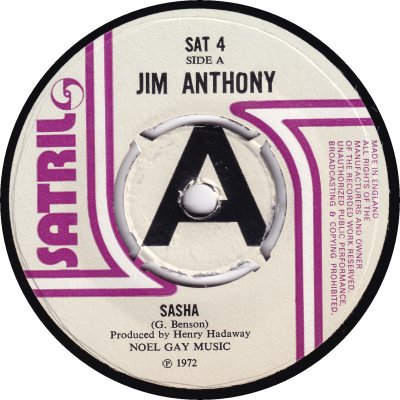
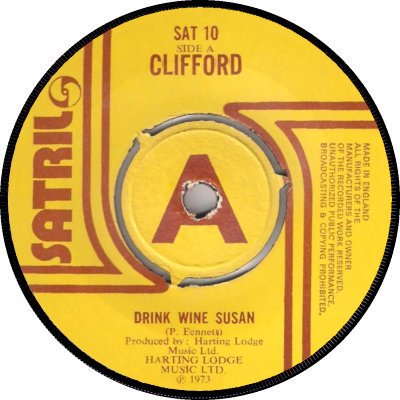
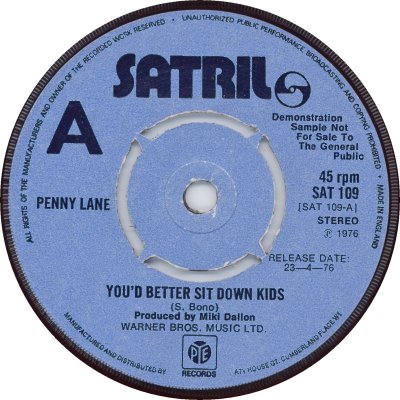
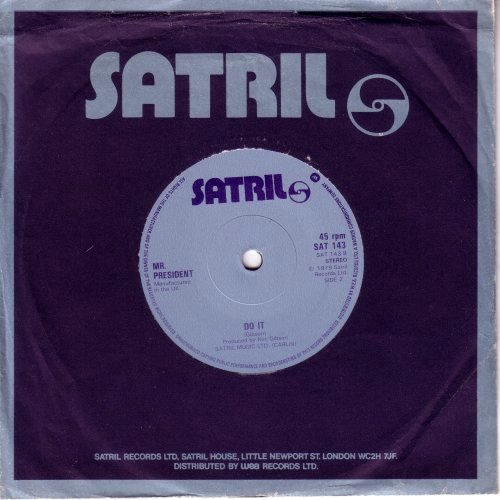
Satril was the record label of the Henry Hadaway Organization; it worked out of premises in Gerrard Street, London W1 at first, but moved to Little Newport Street WC2H by the end of the decade. It started out as a management agency in 1969, and placed a single produced by Henry Hadaway, 'She Was A Woman' b/w 'Green Green Boy' by Shubert, with Major Minor that same year - it came out as MM-663 in November. News that the company planned to make its own venture into the record market came in 'Record Retailer' of the 15th of January 1972, which said that the intention was to launch a label 'later in the year' through small independents Mushroom (q.v.). Matters moved swiftly, and 'RR' of the 26th of February was able to report that Satril Music, which it described as a management and publishing firm, had signed a 'lease tape' deal; the deal was struck with President rather than Mushroom. Just over a month later the successor to 'RR', 'Music Week' was able to reveal that Satril's first release was available through Selecta and the British Independent Record Distributors group, as well as via President's own van sales network.
Satril stayed with President for a couple of years and issued eleven singles, which were numbered in a SAT-0 series. None of them troubled the Chart compilers, and they're not commonly found. During that time the company's only mention in the Trade press came in 'MW' of the 21st of April 1973, which reiterated that its records were available through Enterprise, Selecta, H. R. Taylor and Lugton outside London - presumably President's vans serviced the London area. There appears to have been a lull after the eleventh single came out, in July 1973, but 'MW' of the 25th of May 1974 was able to announce that Satril had moved on and had signed to Pye for the UK. Its products were to appear on the Pye label for the first year, but provision had been made for it to have its own label identity after that point. The first single to be released under the deal was to be 'Looking Glass' b/w 'Boogaloo Pie' by the Rockin' Berries. That single duly appeared, as Pye 7N-45362, the same month, with a credit to Satril Records on the labels (3); it was followed by five others, which are listed in the discography below for the sake of interest (!). Then in April 1975 the Henry Hadaway Organization put out a couple of singles on the Rainbow label (see 'Rainbow (RBW prefix)', which seem not to have been covered by the Pye arrangement for some reason - perhaps Pye turned them down?
In accordance with the agreement, after the stipulated time Satril re-emerged as a label in its own right. It came with a new label design (4) and with its singles now numbered in the SAT-100s; first out of the blocks was the Rockin' Berries' 'The Lonely Summertime' b/w 'Send Me No Letters' (SAT-101; 8/75). Over the course of the next two years the company issued a steady stream of singles, usually in a Pop or Disco / Dance vein, and it enjoyed modest Chart success with a couple of them: 'The Sandpipers' version of 'Hang On Sloopy' b/w 'Skidrow Joe' (SAT-114; 10/76) reached the No.32 spot, while 'Ariana' b/w 'Sunday Morning' by Stardust (SAT-120; 8/77) stalled at No.42. When the Pye deal expired, towards the end of 1977, Satril moved to WEA, signing a four-year licensing deal with that company. According to the report in 'MW' of the 22nd of October 1977 the agreement with Pye had been for pressing and distribution only, during the final two years, which suggests that the singles which came out on Pye previously had been covered by a licensing deal. In the event Satril stayed with WEA for only two years instead of four, and of its releases only 'Dragon Power (Parts 1 and 2)' by the J.K.D. Band (SAT-132; 6/78) managed to tickle the Charts, reaching the No.58 position. The final WEA-era Satril single came out in September 1979; 1980 saw the label back with Pye / PRT, with another new label design and with singles now numbered in the HH-150s. It continued to release records until around 1985.
Satril used two label designs during the 1970s. An initial eye-catching pale-grey-claret-and-white design (1) changed colour to brown-on-yellow (2) with SAT-8. At the time of the re-emergence at Pye the 'ticks' disappeared, the logo moved to the top of the label, the colour changed to blue, and a Pye logo appeared at six o'clock (4). This design remained fundamentally unchanged after the move to WEA, except that that the Pye logo at the bottom disappeared (5) - thanks to John Timmis for that scan - but after a couple of releases the Warner Communications logo appeared at around the two o'clock mark and a hollow 'A' was added at ten o'clock (6). Demo copies were overprinted with a medium-sized central 'A' during Satril's time with President (7, 8); thanks to Charlie Chalk of the 45cat site for the use of his yellow promo scan here. Issue copies of SAT-8 had yellow labels, demo copies had the old grey ones. Pye-era promos had a smaller 'A' and the appropriate text added (9). The hollow 'A's on WEA singles are just there to indicate the appropriate side. The company sleeve dates from the WEA years. The few early Satril singles that I've seen in the vinyl were pressed by British Homophone, with which President was closely involved; Pye handled manufacture after the move from President till the move to WEA. WEA had its own pressing plants, so it seems reasonable to guess that at least some Satril singles were pressed there, but it also had contract pressings made by the likes of Damont, in which it owned a large holding, and CBS. The discography below only covers the '70s.
